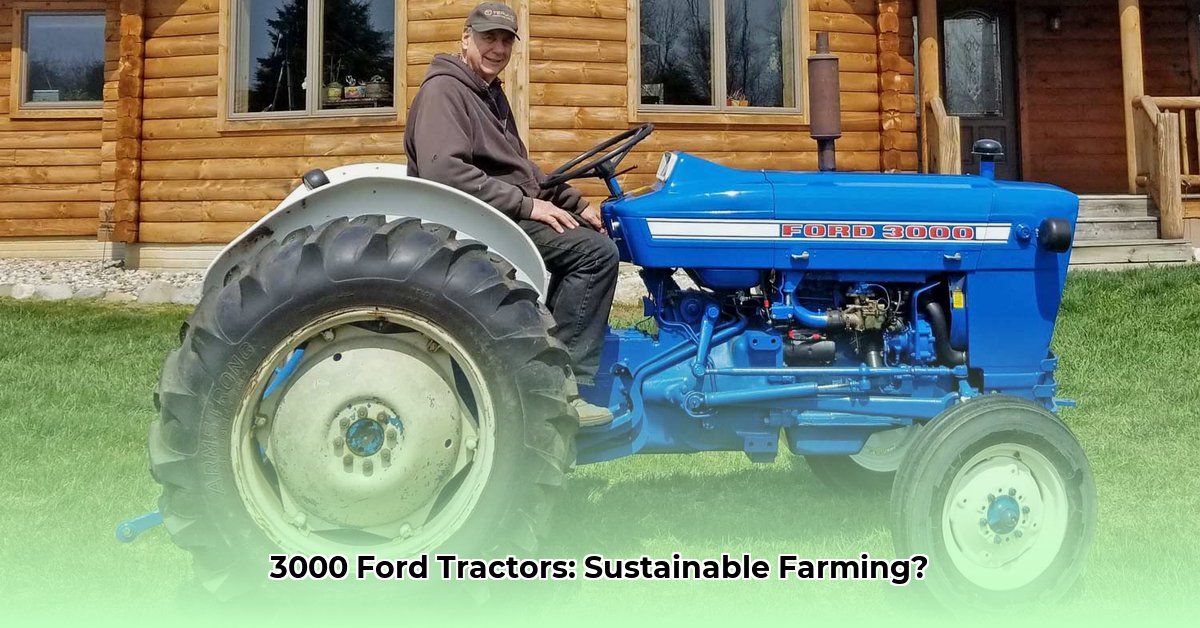
3000 Ford Tractors: A Sustainable Farming Solution?
Farming sustainably often necessitates balancing environmental responsibility with economic viability. The Ford 3000 tractor, particularly in the used market, presents an intriguing case study within this context. Its affordability makes it accessible to smaller farms and beginning farmers, but its age and inherent limitations raise questions about its long-term sustainability. This analysis explores the trade-offs involved in utilizing a Ford 3000 for sustainable agricultural practices. For more on Ford tractor issues, see this helpful resource: Ford Tractor Problems.
Are Ford 3000 Tractors truly a cost-effective choice for sustainable farming? The answer, as we shall see, is complex and depends significantly on individual farm circumstances and operational scale.
The Appeal of Affordable Ford 3000 Tractors
The initial allure of a used Ford 3000 tractor is its significantly lower purchase price compared to new models. Prices typically range from $3,000 to $8,000, representing substantial savings for budget-conscious farmers. This accessibility can be a game changer for those starting out or operating on limited capital. However, this initial cost saving shouldn't overshadow the complete picture of long-term ownership expenses.
Operational Capabilities and Limitations
While older, Ford 3000 tractors retain considerable utility. Their 46.7 horsepower engine and PTO (power take-off) enable them to perform essential tasks like plowing, tilling, and operating balers. A wealth of online resources further supports their continued operation. However, they lack the advanced features (GPS guidance, sophisticated hydraulics) found in modern tractors, potentially impacting efficiency and precision in certain applications. Can they truly meet the demands of modern, sustainable farming? The answer depends on the scale of the operation.
Fuel Efficiency and Environmental Considerations
A key factor in assessing the sustainability of a Ford 3000 is its fuel efficiency. Older tractors are generally less fuel-efficient than their modern counterparts, leading to higher fuel costs and a larger carbon footprint. This increased fuel consumption can partially, or even fully, offset the initial cost savings. This leads to a crucial question: How can we mitigate the environmental impact of increased fuel consumption? This requires strategic fuel management and consideration of alternative, more fuel-efficient farming practices.
Maintenance and Repair: A Long-Term Commitment
Maintaining a Ford 3000 requires diligent upkeep. Preventative maintenance is vital to minimizing costly repairs. While parts are generally available, their cost and accessibility should be thoroughly researched before purchase. The anticipated maintenance expenses need to be carefully factored into the overall cost of ownership, potentially eroding the initial price advantage. What are the long-term maintenance costs associated with a Ford 3000 compared to newer models? Detailed cost projections, considering both labor and parts, are crucial for making informed decisions.
Ford 3000 Tractors and Sustainable Agriculture: A Nuanced Perspective
The suitability of a Ford 3000 for sustainable agriculture is contingent upon several factors. For small-scale operations with limited capital, the affordability can be transformative. Careful fuel management and the strategic selection of less fuel-intensive tasks may help offset higher fuel consumption. However, large-scale operations striving for optimal efficiency and minimal environmental impact might find newer, more efficient models more suitable. Ultimately, the decision hinges on a farm's specific needs and resources.
Decision-Making: A Practical Checklist
The following factors are critical when considering a Ford 3000 tractor:
| Feature | Considerations |
|---|---|
| Initial Cost | Significantly lower than new tractors; a key advantage for budget-conscious farms. |
| Operating Costs | Higher fuel consumption and maintenance; necessitate long-term cost-benefit analysis. |
| Parts Availability | Generally good; research local availability and pricing to avoid potential delays and expenses. |
| Environmental Impact | Higher emissions; requires careful consideration of environmental sustainability goals. |
| Farm Size & Operations | Best suited for smaller-scale farming operations. |
Long-Term Sustainability: Beyond the Initial Investment
Sustainable farming requires holistic planning. Key considerations include:
- Preventative Maintenance: Regular maintenance minimizes unexpected breakdowns and extends the tractor's lifespan.
- Fuel Efficiency Strategies: Employing fuel-saving techniques like proper tire inflation and minimal idling can significantly reduce fuel consumption.
- Responsible Disposal: Planning for its eventual retirement and employing environmentally sound disposal methods are crucial.
In Conclusion: The viability of a Ford 3000 for sustainable agriculture is situation-dependent. While its affordability is a significant benefit, potential increases in maintenance and operating costs, coupled with environmental considerations, demand careful evaluation. A thorough cost-benefit analysis, encompassing both short-term and long-term perspectives, is essential for making a well-informed decision. Sustainable agriculture demands a comprehensive approach that considers the entire lifecycle of equipment.